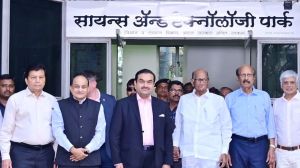Wash it away
Mayawati resorts to the anxieties of an older caste politics. It won8217;t work

Just a week ago, Mahendra Singh Tikait8217;s futile attempt to claim political relevance in western Uttar Pradesh provided a measure of how much our politics had matured. Tikait, by using casteist references to UP Chief Minister Mayawati, was trying to revive the kind of tensions between Dalits and the middle castes that has for long kept caste-based leaders in business. In the end, even the politicians who would use him to break Mayawati8217;s rainbow coalition instinctively distanced themselves from the offensiveness of his words. It was a reminder that the language of caste8217;s brutal oppressions would not be tolerated. It is unfortunate, therefore, that Mayawati chose this week to take recourse to the idiom of caste politics that we seemed to have transcended last week.
Addressing a public meeting in Azamgarh on Monday, Mayawati mocked Rahul Gandhi8217;s visits to Dalit homes. She alleged that it was just a political ploy and that the Congress general secretary follows up such visits with a purification regimen, adding that he employed a 8220;special soap8221; for the purpose. This is not reflective of a politician who seemed to promise the empowerment of oppressed communities by winning a majority in the state assembly in last year8217;s elections. In building a rainbow coalition bottom up, she showed that democracy could transcend the oppressions of the caste system. It was an inversion of the top-down social coalition that made the Congress party so dominant electorally for the first decades after Independence. Mayawati is too smart to believe her own words. Her ludicrous allusion to 8220;special soaps8221; clearly comes from an anxiety to hold on to her voters, and possibly to create issues that she could carry into the assembly elections this year in northern states.
By doing this, Mayawati of course belies her own promise. But she also misreads the momentum of politics. Political mobilisation has been an important way of bringing dominated social communities into the national mainstream. Electoral democracy has in that sense been a modernising process. It bears repetition that Mayawati has been a prime practitioner of this. But this is not a process that can be instantly reversed to suit her electoral requirements. Having done her bit to reconfigure the way people vote with self-belief, politicians like her will find little purchase amongst the voters if they return to them with the anxieties of the past. She will float only if she delivers on a governance agenda. Inverting the language of caste discrimination will get her and Indian politics nowhere.
- 01
- 02
- 03
- 04
- 05































